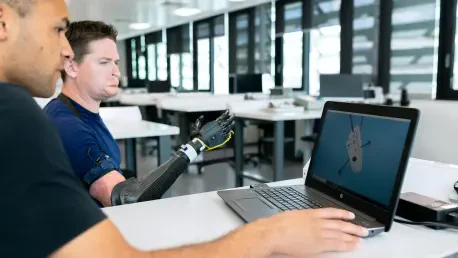In a significant step forward for tech-driven scientific research, a National Science Foundation (NSF) grant has empowered the University of California, Santa Barbara, to enhance its BisQue platform. With the integration of artificial intelligence and advanced large language models, the UCSB BisQue platform is set to revolutionize how complex datasets are managed across a range of scientific disciplines. Spearheaded by Professor B. S. Manjunath, an expert in the fields of computer vision and AI, this ambitious initiative brings together academics from diverse domains, including Professors Tresa Pollock and Beth Pruitt. The objective is to streamline the often cumbersome process of data handling, allowing scientists to channel their efforts toward groundbreaking discoveries instead of technical complications. By focusing on sectors like materials science, environmental science, and bioimaging, the initiative assures tailor-made AI solutions that address each field’s unique demands.
Transforming Scientific Research with AI
The focal point of this initiative is the development of the BisQue Deep Learning (BDL) cyberinfrastructure, which promises to address a longstanding need for accessible and scalable AI tools. This innovation is not merely a technological upgrade but a paradigm shift for researchers worldwide. The strategy involves simplifying data management, thus freeing scientists to prioritize discovery over resolving technological barriers. With spatio-temporal annotations, object detection, segmentation, and classification at its core, the platform is set to handle large-scale imaging data seamlessly. By combining cutting-edge AI with user-friendly design, the BDL cyberinfrastructure aims to facilitate comprehensive data interpretation and exploration. Researchers can now delve deeper into their respective fields, whether it’s building materials that predict properties in real time or exploring similar applications in space and nuclear studies, all thanks to this enhanced platform.
Moreover, the platform’s scalability is a key feature that ensures it can grow alongside the ever-expanding universe of scientific data. The balance between innovation and accessibility is meticulously maintained, making sure these advanced tools are available not just to elite institutions but to a diverse range of scientific communities. With this capability, the UCSB BisQue platform emerges as a crucial player in the democratization of technology, creating a level playing field for all researchers aspiring to advance their knowledge and solutions to pressing global challenges.
Encouraging Educational Growth and Strategic Collaboration
Integral to the project is its emphasis on education and diversity, which manifests through comprehensive training programs designed to democratize access to advanced AI tools. By investing in education, the initiative ensures that future generations of scientists are well-equipped to leverage these technologies to their maximum potential. These programs foster innovation, addressing global challenges with fresh perspectives and strategies. The development of the BisQue platform stands as an example of how educational excellence can go hand in hand with technological advancement, setting a precedent for future endeavors.
In addition to educational efforts, strategic partnerships are a cornerstone of this NSF-supported venture. Collaborations with institutions like UC Riverside and the Smithsonian Institution not only broaden the platform’s impact but also ensure its long-term sustainability. This extensive network inherently supports a multi-disciplinary approach, tapping into a wealth of knowledge from various scientific communities. By incorporating community feedback, the initiative continuously refines its tools and methodologies, resulting in a robust toolset that evolves over time. This iterative process guarantees that the platform stays at the forefront of innovation, meeting the ever-changing needs of researchers.
Pioneering a New Era in Scientific Discovery
The centerpiece of this initiative is the development of the BisQue Deep Learning (BDL) cyberinfrastructure, which aims to fulfill a vital demand for widely accessible and scalable AI tools. This isn’t just a tech upgrade; it’s a revolutionary approach for researchers globally. The plan simplifies data management, allowing scientists to focus on discovery without being bogged down by technological challenges. With features such as spatio-temporal annotations and capabilities in object detection, segmentation, and classification, the platform efficiently manages large-scale imaging data. By merging advanced AI with intuitive design, BDL’s infrastructure supports thorough data analysis and exploration. Researchers can dive deeper into various domains, like creating materials that predict properties in real time or investigating applications in space and nuclear studies, all enabled by this advanced platform.
Scalability is a standout feature, ensuring it evolves with the growing scientific data universe. Balancing innovation and accessibility, the UCSB BisQue platform becomes essential in democratizing technology, providing equitable opportunities for researchers to tackle global challenges.









